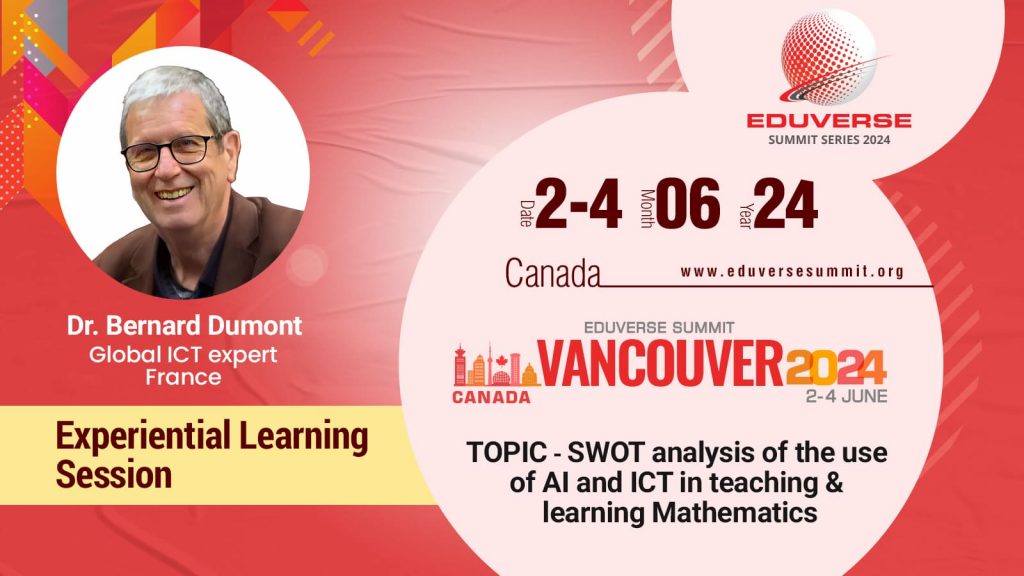Dr. Bernard Dumont, a renowned personality in the field, will discuss the remarkable potential of Artificial Intelligence (AI) and Information and Communication Technologies (ICT) in education at the upcoming education event in Canada – Eduverse Summit Canada 2024.
Dr. Dumont’s experiential session: A SWOT analysis of the use of AI and ICT in teaching and learning mathematics
The main goals of the session are:
- Examination of the role of AI and ICT in mathematics education (primary and secondary school)
- Conducting a SWOT Analysis of AI and ICT Integration in Mathematics teaching and learning
- Provide concrete examples, general considerations, and recommendations
- Empower educators with practical insights and strategies
- Facilitate discussion and knowledge sharing among participants
What can you expect in the session?
The combination of artificial intelligence (AI) and information and communication technology (ICT) is at the forefront of revolutionary change in today’s rapidly changing educational environment. The use of AI and ICT in education is becoming not only necessary but also crucial as we work through the challenges of preparing students for a world that is becoming more digital and networked. The COVID-19 epidemic has expedited the integration of digital technologies in the field of education, underscoring the pivotal significance of ICT in enabling distance learning, endorsing hybrid teaching, and guaranteeing the uninterrupted operation of education in the face of unparalleled disruptions. AI and ICT have become extremely helpful, as educators can easily adjust to the realities of distant and blended learning environments.
In his article, he wrote, “In primary school mathematics education, ICT tools may include interactive whiteboards, educational software applications, online tutorials, and educational websites. These tools aim to enhance engagement, visualization, and conceptual understanding of mathematical concepts through interactive and multimedia-rich experiences. At this level, AI can be understood as the use of algorithms and machine learning techniques to assist in the delivery of mathematics instruction. This can also include AI-powered educational games and interactive learning platforms.” “At the secondary school level, ICT tools play an interesting role in mathematics education by offering advanced visualization capabilities, simulation tools, and access to vast online resources, interactive exercises, and opportunities for collaborative learning and discussion. In secondary schools, AI applications in mathematics education have become more sophisticated. For instance, AI-powered virtual tutors can guide students through complex mathematical problems, offering hints and explanations, possibly by offering the students the opportunity to pose their problems by writing it by hand.”
He also mentioned the strengths and weaknesses of AI and ICT in mathematics education:
- The strengths of AI and ICT in mathematics education lie in their ability to enhance teaching effectiveness and improve learning outcomes through various means:
- Personalized learning and instant feedback and assessment using tutoring systems
- Interactive learning experiences such as simulations and virtual laboratories
- Concept reinforcement and remediation, with concept mapping tools and intelligent problem-solving tools
- Conversational agents engage students in natural language dialogue, answering questions, providing explanations, and facilitating interactive problem-solving sessions in real-time
- Access to online resources and collaborative learning environments
- And AI-powered educational games and apps make learning math fun and engaging, fostering intrinsic motivation and deeper conceptual understanding.
Dr. Dumont recognizes that AI and ICT are not silver bullets. The session will also explore the challenges and considerations that come with integrating these technologies into the classroom.
- Excessive reliance on AI and ICT tools may lead students to focus more on algorithmic solutions rather than developing deep conceptual understanding.
- Belief in the infallibility of AI tools may lead students to accept results and solutions without critical thinking, although some may be incorrect.
- Inefficient teacher training
- Loss of human interaction
He will also discuss the opportunities, threats, and considerations of AI and ICT.
By the end of the session, participants will gain a deeper understanding of the opportunities and challenges associated with the use of AI and ICT in mathematics education in primary and secondary education, along with actionable insights and best practices for leveraging these technologies to enhance teaching effectiveness and student learning outcomes. And they will also learn about the possibility of creating a remote discussion group to follow the evolution of these technologies in mathematics education and to share and analyze case studies.
Equipping educators with practical strategies
This session goes beyond theory. Participants will gain practical insights and strategies for using AI and ICT in their classrooms.
-
Actionable takeaways
Educators will be equipped with actionable takeaways that can be implemented immediately. These include best practices for using AI and ICT tools, along with strategies for promoting critical thinking and fostering a love for math in students.
-
Hands-on experience
An interactive workshop will allow participants to test-drive popular math apps and software, providing a practical understanding of how these tools can be used effectively.
-
Building a network
The session fosters collaboration among educators. Participants will have the opportunity to share their experiences, ask questions, and connect with colleagues who share their passion for transforming math education.
The future of math education is now
By harnessing the power of AI and ICT, educators can create a dynamic and engaging learning environment where every student can thrive. Dr. Dumont’s session is a must-attend for anyone who wants to be part of this exciting math education revolution.
Join the discussion: Register now for Eduverse Summit Canada
The Eduverse Summit Canada 2024 is a unique opportunity for educators to learn from leading experts and collaborate with colleagues who share their passion for math education. Here’s how you can be a part of it:
- Register for Eduverse Summit Canada 2024: Don’t miss this unique chance to be part of this groundbreaking event. Secure your spot today!
- Spread the word: Share the news with your peers and friends interested in reshaping education’s future.
- Become an advocate: Gain first-hand knowledge about the use of AI and ICT in mathematics education and incorporate it into your business and teaching approaches.






